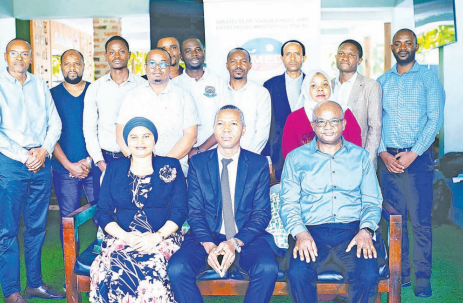How Tanzania strengthens innovation ecosystem

IN a digital age defined by fastpaced transformation, Tanzania continues to position itself as a regional hub for innovation, entrepreneurship and youthdriven development.
The country’s commitment to nurturing a dynamic startup ecosystem was once again highlighted during the 2025 Regional Business Incubator Management Workshop, held in Dar es Salaam.
The four-day forum, which brought together business leaders, government officials, innovators and academics, showcased how collaboration, creativity and capacity building are reshaping the future of enterprise development in the country.
Space for ideas to thrive
The workshop, organised by the Institute of Management and Entrepreneurship Development (IMED) Limited, set out to do more than just share ideas. It provided a platform for incubator managers, innovation hub leaders and policymakers to exchange practical knowledge on how to support startups and strengthen innovation ecosystems nationwide.
From the opening day, the tone was clear innovation is not merely a buzzword but a national necessity. The gathering emphasised that for Tanzania to remain competitive, incubators must serve as catalysts that turn raw ideas into sustainable ventures capable of solving realworld challenges.
Participants engaged in intensive training sessions at the Four Points by Sheraton in Dar es Salaam, where experts led interactive discussions on governance, mentorship and the role of technology in scaling small businesses. The final day featured field visits to established innovation hubs, allowing participants to connect theory with practice.
Building the Foundation for a Digital Future
Throughout the workshop, speakers underscored the importance of innovation-driven entrepreneurship as a key driver of employment and inclusive growth. The message was consistent empowering innovators today means securing economic resilience for tomorrow.
One of the major themes of the sessions was collaboration the understanding that innovation ecosystems flourish not in isolation but through strategic partnerships between government, academia and the private sector.
Representatives from diverse institutions including the Tanzania Women Chamber of Commerce (TWCC), the Ministry of Livestock and Fisheries, Muhimbili University of Health and Allied Sciences (MUHAS), the State University of Zanzibar and Sahara Ventures, among others, reflected the wide reach of Tanzania’s innovation landscape.
Each participant brought unique insights from public officials focused on integrating innovation into policy, to academics exploring commercialisation of research, to incubator managers working tirelessly to support young entrepreneurs with limited resources.
Learning by seeing
A key highlight of the event was the visit to Sahara Ventures, one of Tanzania’s most vibrant innovation spaces. Participants were inspired as they witnessed firsthand how startups in fintech, agritech and health innovation are addressing pressing community challenges through creativity and technology.
The visit provided more than just exposure it offered tangible examples of how innovation hubs can serve as practical laboratories for economic transformation. The participants returned motivated to replicate similar models within their regions and institutions.
Call for sustainable innovation
During the closing ceremony, Dr Amos Nungu, Director General of the Tanzania Commission for Science and Technology (COSTECH), commended the initiative and encouraged participants to define success not just through statistics, but through tangible community outcomes.
He remarked that the measure of progress should extend beyond the number of startups supported or the amount of capital raised. “True success lies in the sustainable businesses that thrive, the jobs created and the communities uplifted through innovation.”
Dr Nungu highlighted that, “Business incubators serve as lifelines for early-stage entrepreneurs who often struggle to access mentorship, investment, or business guidance. Incubators provide a bridge between potential and reality offering the structure and support needed to transform promising ideas into viable enterprises.”
He further noted that, “With over 60 per cent of Tanzania’s population under 25, workshops like this are essential to unlocking youth potential and addressing unemployment through innovation. Our future depends on how well we convert creativity into opportunity.”
Turning vision into action
Dr Donath Olomi, Director of IMED, described the workshop as both an investment in knowledge and a declaration of intent. He applauded participants for their dedication and willingness to challenge outdated systems.
Dr Olomi reminded attendees that their influence extends far beyond managing workspaces. “As incubator leaders, you are mentors and nationbuilders. Each time you help a startup succeed, you contribute to economic growth, social stability and hope,” he noted.
He encouraged that, “Collaboration across hubs and regions, noting that innovation flourishes in environments built on trust and shared purpose. An incubator is not just a space with desks and Wi-Fi it’s a community of people who believe in the power of ideas to change lives,” he said.
He also called for stronger partnerships between government, academia and the private sector, arguing that no single entity can build an innovation ecosystem alone. “We must connect talent with opportunity, research with investment and ambition with mentorship,” he urged.
Gender dimension of innovation
Among the notable participants was Dr Mwajuma Hamza, Executive Director of the Tanzania Women Chamber of Commerce (TWCC). Her presence brought a vital perspective to the discussions, focusing on how gender inclusivity strengthens innovation.
Dr Hamza emphasised that while women form a large portion of Tanzania’s entrepreneurial sector, they continue to face obstacles such as limited access to finance and mentorship, as well as persistent cultural biases.
She pointed out that, “Women make up a significant portion of Tanzania’s entrepreneurial sector, especially in small and medium enterprises, yet they continue to face barriers that limit their growth.
Access to financing remains one of the largest hurdles; many women lack the collateral or formal credit history required by banks and investors. Equally challenging are cultural perceptions that often discourage women from scaling their businesses or taking risks in new sectors such as technology and agritech.”
She highlighted the need for mentorship initiatives that connect aspiring women entrepreneurs with successful role models and for training that builds financial literacy and confidence. “When women are empowered to lead, their communities grow stronger,” she added.
Dr Hamza urged that, “Incubator managers and policymakers to look beyond the traditional models of support and design programmes that reflect women’s lived realities. Mentorship builds confidence and helps women navigate challenges that others have already overcome,” she explained.
Building resilient communities through innovation
Beyond individual success stories, the workshop revealed a broader picture of transformation underway in Tanzania’s innovation ecosystem. The growing network of hubs and incubators across the country represents a collective effort to build resilience in an uncertain global economy.
Through such initiatives, youth are gaining the skills and networks needed to create self-employment opportunities. Universities are beginning to commercialise research and policymakers are learning how to better align national priorities with entrepreneurial realities.
Participants noted that innovation is no longer confined to urban centres. Regional hubs are emerging, enabling rural innovators to access digital tools and business mentorship without migrating to major cities. This decentralisation of opportunity is seen as a key step toward balanced national growth.
Looking Ahead: Collaboration as the Way Forward
The workshop concluded with a renewed sense of optimism. Stakeholders pledged to continue strengthening partnerships and to expand capacitybuilding programmes for incubator managers across the country.
Dr Olomi and Dr Nungu both reiterated the need to institutionalise support for innovation, ensuring that efforts are not project-based but part of a sustainable national strategy.





